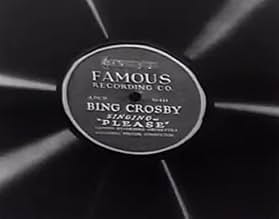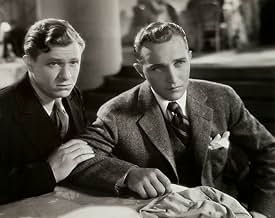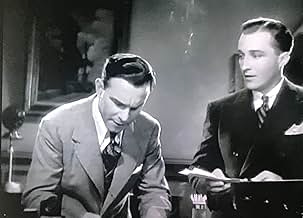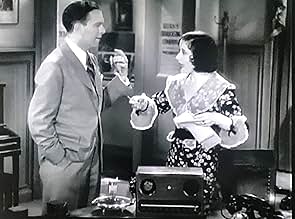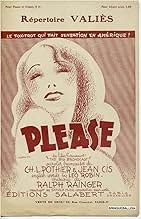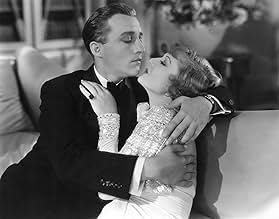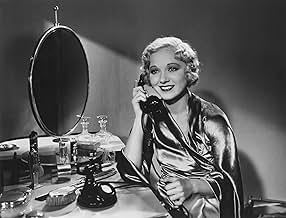A radio-singer, Bing Crosby, is none-too-concerned about his job, and an affair with Mona leads to his dismissal. When it appears Hornsby is getting and paying a lot of attention to his fian... Read allA radio-singer, Bing Crosby, is none-too-concerned about his job, and an affair with Mona leads to his dismissal. When it appears Hornsby is getting and paying a lot of attention to his fiancée, Anita Rogers, station manager Leslie McWhinney buys the station, gives Hornsby his jo... Read allA radio-singer, Bing Crosby, is none-too-concerned about his job, and an affair with Mona leads to his dismissal. When it appears Hornsby is getting and paying a lot of attention to his fiancée, Anita Rogers, station manager Leslie McWhinney buys the station, gives Hornsby his job back, and goes on a honeymoon with Anita.
- Director
- Writers
- Stars
- Awards
- 1 win total
- George
- (as Burns and Allen)
- Gracie
- (as Burns and Allen)
- Director
- Writers
- All cast & crew
- Production, box office & more at IMDbPro
Featured reviews
"The Big Broadcast" has Bing (also his character's name) more preoccupied with his fiancee Mona Lowe (Sharon Lynn) than his radio show when he shows up late for his broadcasts. The manager, George Burns (yes, the comedian), is on the verge of losing his radio station to bankruptcy. The movie's premise parallels Bing's early radio career when he didn't appear for the first couple of days to his premier '15 Minutes with Bing Crosby.' CBS had heavily promoted the singer's August 31, 1931 debut, but after rehearsing in a frigid air-conditioned studio earlier that day, his failure to come to the station that evening and on the following night led to rumors he was either too drunk or too nervous to sing. In reality, Crosby came down with a case of laryngitis.
"The Big Broadcast" was also George Burns' and his wife Gracie Allen's first feature film. Orphaned at a young age, Burns teamed up with three other kids to form the "Pee-Wee Quartet." Later in vaudeville, he was paired with females as a sounding board for his comic, singing and dancing routines. After one brief marriage, he partnered with Gracie Allen in 1923 and married her three years later. Burns recalled, "And all of a sudden the audience realized I had a talent. They were right. I did have a talent-and I was married to her for 38 years." At first Gracie said all the serious lines while George was the comic. As time passed, Burns discovered her quips were getting more laughs than his supposed funny jokes, so they switched deliveries. Gracie is the station manager's secretary in their debut film. The couple went on to become highly popular on the screen, in radio and on television.
"The Big Broadcast's" showcased several popular radio personalities as the station's new owner, Texas oilman Leslie McWhinney (Stuart Erwin), organized a single-night singing extravaganza to raise money. Cab Calloway, The Mills Brothers, Eddie Lang and Kate Smith are shown performing in front of the mic. Crosby himself sang three songs , including his hit 'Where the Blue of the Night Meets the Gold of the Day,' nominated by the American Film Institute as one of 400 tunes for the top 100 Songs in American Movies. The film was such a box office hit it spawned three additional feature films, "The Big Broadcast of 1936," "1937" and "1938." Newspaper reviews were generally very positive about Crosby's future in the entertainment world. Wrote the film critic for The New York American, "Bing Crosby is the star, make no mistake about it. He has a camera face and a camera presence. Always at ease, he troupes like a veteran." The reviewer must have had great intuition because Crosby went on to make over 70 feature films in his lifetime.
When the story begins, Bing is late for a radio broadcast and it's not all his fault. Like many famous crooners, he's attacked by adoring fans and barely makes it to the studio in one piece! But the sponsor is furious with Crosby and demands he be fired...and the station's owner (George Burns) complies. However, soon they regret it because Bing is such a big star.
In the meantime, Bing's life goes from bad to worse, as not only is he off the radio, but his girlfriend has just run of with another man! He soon meets Les (Stu Erwin) in a bar and he, too, has girl trouble...so they both decide to kill themselves! Wow...talk about a dark turn. Now all this happens in the first 10-15 minutes of the film...so rest assured...they'll be alright. What's next? See the movie and find out yourself.
While much of this film was an excuse to feature various radio acts (not just Crosby but Kate Smith, the Mills Brothers, Cab Calloway and a few others), it actually had more story than I expected from a movie like this. Overall, an interesting look at some wonderful musical acts and a decent story as well...made better by Erwin and his pleasant persona.
This entire more is tongue-in-cheek, so if you like that humor, you'll split your sides laughing. Once, Stuart enters an empty room and says to the camera, "Hmm, no chair." From off-camera, someone literally slides a chair into frame for him to sit on. In another scene, Leila Hyams says, "First I cry because I'm happy, now I want to do something even sillier." Stuart guesses, "You want to laugh because you're sad?" The main plot of the movie involves a love triangle between Stuart, Leila, and Bing, and the film discusses the concept of hero worship, celebrity crushes, and real love. All that in a silly comedy? Well, when a comedy is a good comedy, it can revolve around actual topics while still including humor. So, the answer is yes.
In one scene, Bing and Stuart wake up in twin beds with no memory of what happened the night before. "This is my bedroom," Bing says, looking at the sheets. In the neighboring bed, Stuart asks, "Are we married?" Then, in pre-Code glory, the camera captures Leila's legs as she slips her negligee and underwear off then hops in the shower. Both Bing and Stuart talk to her while she's covered in only a shower curtain, and once she's fully dressed, Stuart shows her off and says, "Feel how solid she is!" Bing looks her up and down then asks Stuart where he should squeeze. Aren't pre-Code movies grand?
Unfortunately, once the "big broadcast" actually happens, during the last thirty minutes of the movie, it's full of radio acts and singers who are no longer household names today. Modern audiences will probably be very bored by the ending, but if you're bored, just remember the hilarity of the first part of the movie.
The slight plot revolves around Bing Crosby (Bing Crosby), the most popular singer at WADX Radio Station in New York City. Due to his constant lateness, Mr. Clapsaddle (George Barbier), the upset sponsor, forces radio manager, George Burns (George N. Burns) to have Crosby fired. Anita Rodgers (Leila Hyams), Burns' secretary, silently loves Bing, though he fails to notice her. Bing is engaged to marry dancer, Mona Lowe (Sharon Lynn), the one responsible for his irresponsible behavior. While celebrating his final days as a bachelor with his friends at a speakeasy, Bing sees a newspaper article of Mona eloping with a broker and jilting Crosby. After befriending an equally depressed Leslie McWhinney (Stuart Erwin), a Texas oil man jilted by the girl he loves and being taken for $100,000 by a gold-digging widow, Bing invites the poor soul to his apartment where he plans a double suicide. Bing's plot fails with the arrival of Anita, Leslie's girlfriend from back home, with the news of Mr. Burns agreeing to give Bing his job back now that he's no longer engaged to be married. As Bing arranges to find Leslie a job at the studio, warrant officers turn up to close down the station. With his remaining $900,000, Leslie buys the radio station and becomes its president. All goes well until Mona Lowe returns to Bing life again, making him irresponsible once more. Here lies love.
With old and new tunes (by Leo Robin and Ralph Rainger) combined for THE BIG BROADCAST, the musical program features that of "Dinah" (sung by Bing Crosby); "Speakeasy" (sung by telephone operators, Major, Sharp and Minor); "Here Lies Love" (sung by Arthur Tracy); "Here Lies Love" (reprised by Crosby); "Please" (Crosby); "Tiger Rag" (sung by the Four Mills Brothers); "Please" (reprise by Crosby); "I'm the Drummer" (sung by Vincent Lopez); "Trees" (sung by Donald Novis); "Crazy People" (sung by The Boswell Sisters); "It Was So Beautiful" (sung by Kate Smith); "Kicking the Gong Around" (sung by Cab Calloway); and "Please" (finale). At one point in history, a motion picture soundtrack of THE BIG BROADCAST was available through Sandy Hook records in the 1980s, but the movie itself thus far has never been distributed to home video.
The comedy team of George Burns (radio manager) and Gracie Allen (the receptionist) incorporate their vaudeville routines as part of the plot on two separate occasions rather than during the on-screen radio broadcast. The movie also acquires the brief glimpses of actual radio announcers (James Wallington, Donald Ball, William Brenton and Norman Brokenshire) introducing the upcoming acts. Paramount pulls no stops on broad comedy, whether cartoonish, the use of high speed projection, laughing toy horses or even allowing material reminiscent to those silent comedy era through situations enacted through radio theme music but no inter-titles as the hapless Leslie tries in vain to acquire a Bing Crosby record and prevent himself from either losing or damaging it.
Commonly presented on broadcast television in the 1970s and public television a decade later, the only known cable TV showing in latter years for THE BIG BROADCAST happened to be from American Movie Classics (1990-91). Due to its enormous popularity and career launching of Bing Crosby, Paramount repeated its success with follow-up sequels in name only: THE BIG BROADCAST OF 1936 (1935), 1937 (1936) and 1938 (1938), with the 1938 edition being notable for the feature film introduction of Bob Hope, Crosby's on-screen partner in seven installments to "The Road to" comedy series from 1940-1962. Regardless of surreal plot and situations, THE BIG BROADCAST is nostalgic in its own little way, and should still be of entertaining value even today. One final note: Why do many references refer to Crosby's role as Bing Hornsby? He's addressed and billed as Bing Crosby throughout the entire story. And now, The Big Broadcast. (**1/2)
Did you know
- TriviaBing Crosby's song "Please" became the inspiration for John Lennon to write the Beatles' first hit "Please, Please Me"
- Quotes
Anita Rogers: I love somebody else.
Leslie McWhinney: Whoever he is, he's a fool if he can't see you.
Anita Rogers: [after a long pause] It's Bing.
Leslie McWhinney: Bing?
- Crazy creditsFilm opens with loudspeakers, then segues to lobby cards depicting several of the featured stars "Live".
- ConnectionsEdited into The Great Radio Comedians (1972)
- SoundtracksMinnie the Moocher
Written by Clarence Gaskill, Cab Calloway and Irving Mills
Performed by Cab Calloway
Details
- Runtime1 hour 28 minutes
- Color
- Aspect ratio
- 1.37 : 1
Contribute to this page


